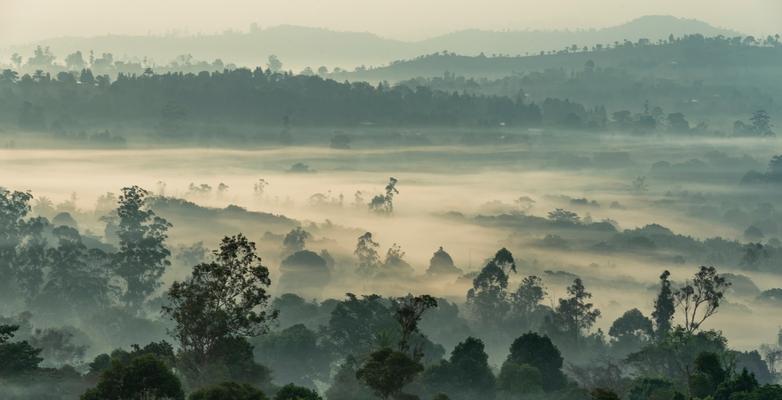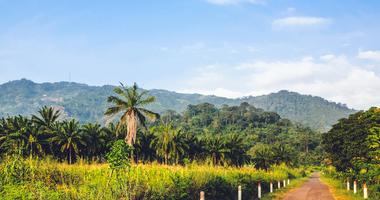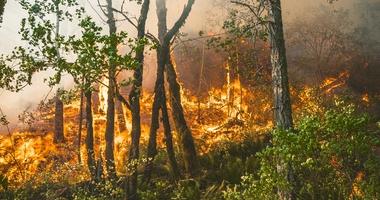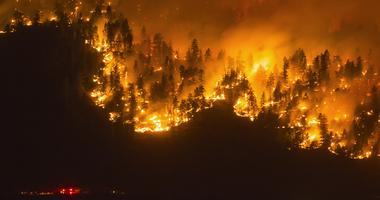
When We Are Taking Care of Our Environment, We Are Actually Taking Care of Ourselves
Ewi Lamma is creating a new approach to climate action and environmental protection in Cameroon – from the ground up.
For Ewi Lamma, a young Climate Reality Leader in Cameroon, working on natural climate solutions like restoring degraded soils and replanting forests isn't just about protecting the planet we share. It's about empowering the communities who inhabit it.
Forests cover roughly 40% of Cameroon and protecting this vital resource from logging, mining, and other interests has become one of the country's primary tools in the global effort to rein in greenhouse gas emissions.
Yet, as Ewi has witnessed, too often the decisions on how these forests are managed comes top-down from people far away and with little input from the local communities who know them best. Not only do the resulting approaches fail to take advantage of local knowledge and ideas, but they also frequently leave out one critical constituency altogether: women.
Ewi set out to turn this approach on its head, developing training programs and structures for women and rural voices to give them a say in climate and environmental policies everywhere from Cameroon's National Assembly to the UN Environment Programme (UNEP).
"As a Climate Leader, you have concern for the environment and the people living within that environment. And taking action means putting your hands on the ground, making sure you are not only about policies, but you are also about work that is being done."
She is keen to emphasize that climate solutions aren't only about high-level policies, but what they mean for how people live. To that end, her work has also focused on helping female entrepreneurs build skills in nature-based climate solutions that both help preserve forest habitats and create real economic opportunities, enabling them to better care for their families.
After all, the way Ewi sees it, these are two sides of the same coin. As she says, "When we are taking care of our environment, we are actually taking care of ourselves." This approach is paying off –as women have been able to increase their income by an astounding 65% in the communities she's worked in, while her efforts with rural councils have led to more than 20 new forest policies.
Before the 2022 edition of 24 Hours of Reality and in conjunction with the launch of "African Voices for African Forests," we had the chance to ask this incredible change-maker some questions about her life and work. (Some answers may be edited and condensed for brevity.)
What was the problem you saw?
After a series of research in forest communities in Cameroon I noticed the exclusion of women and girls in climate change projects and decision-making platforms. I decided to focus on nature-based solutions to solve this problem.
What was your idea to solve it?
I was determined to see responsible decisions on sustainable natural resource management in Cameroon and Africa. I proposed to establish structures that support entrepreneurship and facilitate the channeling of rural voices, especially women and young people for representation in national and international platforms.
"I believe strongly that natural resources should be managed sustainably for the benefit of all people, especially the rural poor who are closer to the resources."
I trained women with livelihood skills like; agroforestry, bush mango processing, beekeeping, mushroom farming, snail cultivation and micro-enterprise development.
My goal is to help rural women find their voice in the Cameroon House of Assembly, find a place with the UNEP and to establish an all-girls institution in a rural community where I will develop, adapt and adopt curriculums on climate education for young girls to build their capacities for placements in future environmental platforms and programs.
Why is this approach so important?
Cameroon’s Vision 2035 identifies climate change as one of the country’s major challenges and calls for the reduction of greenhouse gases to tackle climate change as a key regional strategy for Cameroon.
Under its tentative implementation schedule, drafting and implementation of major environmental policies to fight against the climate change impact were planned for phase one (2010-2019). Climate change control is listed as one of the three specific objectives for phase two (2020-2027).
This is my fuel to fit rural women and communities into the next phase of environmental advocacy by applying cutting-edge policy and planning solutions to the environmental challenges faced by the Cameroon government, businesses, and regulatory bodies.
With a small number of individuals benefiting from forest resources – contributing to the marginalization of the rural population from decision-making on the community forests’ resources –
I believe strongly that natural resources should be managed sustainably for the benefit of all people, especially the rural poor who are closer to the resources. It will take good governance to achieve this.
What were the biggest challenges you faced?
Being a young woman with a strong will to raise my voice for other women, empower them to raise their voice too, creates insecurity in most men around my communities of work. While others see me as not well brought up according to our cultures, others think I am frustrated.
"Be sure about what impact you want to create. Stay focused and believe in yourself. You will be talked down on, attacked on all sides because of your gender, but remember that’s the same course you are fighting for and push on until you see the light at the end of the tunnel."
Results from my masters' dissertation showed that rural women were absent from community forest management decisions and REDD+ projects. The reasons being: low self-esteem, poor representation in the management board and local councils, inadequate knowledge on climate change, and limited access to forest land. This boiled down to the fact that the cultures and traditions would prevent women from taking leading roles especially when it comes to land management.
How did you mobilize people to act?
I conduct socio-economic research in forest communities, run environmental awareness programs on radio, and manage community conservation, and livelihood projects. I also engage with national and international stakeholders on climate change projects and programs where I contribute to shaping policies and programmes for women’s entrepreneurial support in rural communities. In addition, I organize symposia and workshops for discussions around the subject of women inclusion in climate change decisions and programs, establish environmental education programs in schools, and organize school parades.
What advice would you offer someone looking to take action just like you have?
Be sure about what impact you want to create. Stay focused and believe in yourself. You will be talked down on, attacked on all sides because of your gender, but remember that’s the same course you are fighting for and push on until you see the light at the end of the tunnel. Greater is the change we seek than the limitations we face or the barriers raised up before us today.
Remember the process is gradual, therefore patience is needed in the journey. No rush. Be gradual yet consistent. Start with the idea, pen it down but refuse to keep it in the books, go out and take action, do not sit, you will find your team on the field.
How does your work promote equity or justice in your community?
When I see young women admiring the work I do and dreaming of becoming like me someday, I know I am doing great! In one of our eco-clubs, we asked the kids to write a letter to the future and one of them said in their letter that when they grow up, they will want to be like Aunti Stephanie (that’s me) who taught them at the eco club.
In another instance, I was mentoring this young girl during her three months internship with our organization and at the end of her internship, her full report was about me and how she hopes to take a master's in a climate change program so she could become like me someday.
More Cameroonian homes are beginning to allow their girls to get involved in environmental protection. My work with rural community councils has prompted the formulation of over 20 local forest management policies in forest villages which stirred the construction of several nurseries with over 150,000 indigenous tree species for revamping degraded sites and farmlands.
I have recorded a 65% increase in women’s income sources and a 20% involvement of women in local councils in the communities of work. Through my weekly radio programs I reach over 4,000 listeners. to combat natural disasters in Limbe. I led my team to establish eco-clubs in primary schools around Limbe where they are building children’s capacities as climate ambassadors using arts. I volunteer as a country mentor for the African Climate Reality Project, coached 24 mentees from Bogota, Colombia, three mentees from USG/Leap Girl Africa Cameroon and 31 students from PACCPOLICY.
I currently coordinate projects led by women and especially women in the religious sphere in these communities. Religious barriers are broken. This is hope! Women are finding their place and their voice.
Ready to make a difference like Ewi? Sign up to learn more about our upcoming Climate Reality Leadership Corps training in Accra, Ghana.




